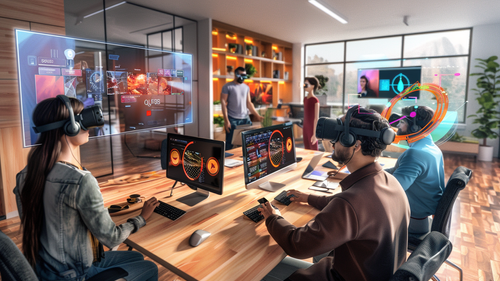Maximise Brand Impact: A Guide to Event Marketing

Engaging customers at brand events is more crucial than ever, especially as virtual events become a staple in marketing strategies. With 68% of organisers struggling to keep audiences engaged, it’s clear that traditional methods need a refresh. How can consumer goods brands, particularly those focused on product sampling campaigns, create memorable experiences that capture attention and foster brand loyalty?
Experiential marketing has shown promise, with 40% of customers believing it enhances their loyalty to a brand. But what makes these experiences truly effective? And how can virtual events overcome their inherent challenges to drive sales and engagement? This article will explore these questions, offering data-driven insights and practical strategies to help brands maximise their event marketing efforts.
The power of experiential marketing in building brand loyalty
Experiential marketing immerses customers in a brand experience, fostering a deeper connection and enhancing brand loyalty. This approach is particularly effective for consumer goods brands, which can leverage product sampling campaigns to create memorable interactions. By allowing customers to engage with products firsthand, brands can build a more personal and impactful relationship with their audience.
The significance of experiential marketing is underscored by the fact that 40% of customers believe it increases their loyalty to a brand. This statistic highlights the potential of experiential marketing to transform casual consumers into dedicated brand advocates. For consumer goods brands, this means creating opportunities for customers to experience products in a way that goes beyond traditional advertising.
Real-world applications of experiential marketing in product sampling campaigns can take various forms. For instance, brands can host pop-up events where customers can try products in a curated environment that reflects the brand’s values and aesthetics. These events can be enhanced with interactive elements such as live demonstrations, workshops, and personalised consultations. By creating an immersive and engaging experience, brands can leave a lasting impression on customers and foster long-term loyalty.
Crafting engaging virtual events: overcoming common challenges
Virtual events have become a staple in marketing strategies, yet 68% of organisers find engagement to be the biggest challenge. This issue arises from the inherent limitations of virtual platforms, which can make it difficult to replicate the interactive and immersive nature of in-person events. However, with the right strategies and tools, brands can overcome these challenges and create engaging virtual experiences.
One effective strategy is to incorporate interactive elements that encourage active participation from attendees. This can include:
- Live polls
- Q&A sessions
- Breakout rooms for smaller group discussions
By providing opportunities for attendees to engage with the content and each other, brands can create a more dynamic and engaging experience.
Innovative technologies can also play a crucial role in enhancing virtual event experiences. For example, augmented reality (AR) and virtual reality (VR) can be used to create immersive environments that allow attendees to explore products and interact with brand representatives in a virtual space. Additionally, gamification elements such as quizzes, challenges, and rewards can add an element of fun and competition, further increasing engagement.
Driving sales through effective event marketing
Event marketing is not only about engagement; it also plays a crucial role in driving sales. In fact, 79% of marketers generate sales through events, highlighting the symbiotic relationship between sales and engagement. By integrating sales strategies into event marketing, brands can create opportunities for direct conversions and long-term customer relationships.
One effective technique is to offer exclusive promotions and discounts to event attendees. This can create a sense of urgency and incentivise immediate purchases. Additionally, brands can use events to showcase new products and provide attendees with the opportunity to pre-order or purchase on the spot. By creating a seamless path from engagement to purchase, brands can maximise the sales potential of their events.
Case examples of successful sales-driven event marketing campaigns can provide valuable insights. For instance, a brand might host a virtual launch event for a new product, complete with live demonstrations, interactive Q&A sessions, and exclusive discounts for attendees. By creating an engaging and informative experience, the brand can drive immediate sales and build excitement around the new product.
Data-driven insights: measuring and enhancing engagement
Collecting and analysing data from events is essential for measuring engagement and refining event marketing strategies. By harnessing data, brands can gain actionable insights into attendee behaviour, preferences, and feedback, allowing them to continuously improve their events.
Methods for gathering actionable insights include surveys, feedback forms, and analytics tools that track attendee interactions and engagement levels. For example, brands can use post-event surveys to gather feedback on what attendees enjoyed and what could be improved. Additionally, analytics tools can provide data on metrics such as attendance rates, session participation, and engagement with interactive elements.
Using data to refine and improve future event marketing strategies is crucial for achieving long-term success. By analysing the data collected from past events, brands can identify trends and patterns that can inform their planning and execution of future events. This iterative approach allows brands to continuously enhance their event experiences and maximise engagement and ROI.
By focusing on these strategies, consumer goods brands can create engaging and impactful event marketing campaigns that drive sales and foster brand loyalty.
Conclusion: the path to enhanced brand engagement
Experiential marketing and innovative virtual event strategies are essential for consumer goods brands aiming to captivate and retain their audience. Immersive experiences, whether through product sampling or interactive virtual elements, deepen customer connections and foster brand loyalty. The data supports this, with 40% of customers saying that experiential marketing boosts their loyalty and 79% of marketers generating sales through events.
Engagement is crucial, and leveraging data-driven insights and cutting-edge technologies can transform virtual events into dynamic, impactful experiences. By continuously refining strategies based on attendee feedback and behaviour, brands can create memorable interactions that drive both engagement and sales. Brands that innovate and adapt will not only capture attention but also forge lasting relationships. The future of event marketing focuses on creating unforgettable experiences that resonate long after the event ends.